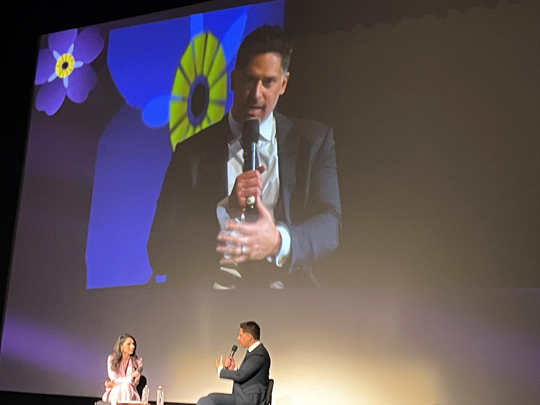
Photo by Mary O’KEEFE
By Mary O’KEEFE
“‘What is done cannot be undone, but one can prevent it from happening again.’ Those are the words of Anne Frank, a teenage girl who gave her voice to the holocaust,” said Inna Sahakyan during the Armenian Genocide Commemorative Event that occurred on April 24 at the Alex Theatre.
“Almost nobody knows the story of another teenage girl,” she added.
Sahakyan is the director and writer of “Aurora’s Sunrise,” the story of Aurora Mardiganian.
Aurora Mardiganian was born in 1901 and was a survivor of the Armenian Genocide.
“Aurora was 14; she lost everything. Her whole family was murdered in front of her eyes. She was sold into slavery, she marched through the desert yet through her courage and intelligence she was able to survive,” Sahakyan said at the commemorative event.
The tale follows the very personal story of Mardiganian’s survival of the Genocide, making her way to the U.S. and sharing her story in book form and then in a silent movie that she starred in. The film was titled “Auction of the Souls” and it was a box office hit in its day.
A preview of the film that tells her story, “Aurora’s Sunrise,” was shared with the Alex Theatre audience.
In addition to the preview, there was a film shown that shared the voices of survivors of the Genocide who gave firsthand accounts that were difficult to hear but important to listen to.
Actor Joe Manganiello was part of the “keynote conversation” with moderator Araksya Karapetyan, anchor with Fox 11. Manganiello is not often associated with the Armenian Genocide but, in fact, his connection is extremely personal.
“My mother is the Armenian [connection] in my family,” Manganiello said.
He had grown up hearing stories of his great-grandmother who had escaped the Armenian Genocide but did not know much about his lineage beyond those stories until he was part of the program “Finding Your Roots” on PBS.
He shared his great-grandmother’s story of strength and how she escaped the Genocide. In 1915, a group known as the Young Turks aimed to wipe out the Armenian population in Turkey. By the time the tortures and murders were completed in 1916 an estimated 1.5 million Armenian souls had been lost.
Manganiello’s great-grandmother lived in Harpoot in Turkey at the time of the Genocide. He said she was in her home when the Turks came in. They shot and killed her husband, who dropped to the floor. They shot her; she fell to the floor but did not die. She heard seven more shots that killed her seven children, and then the Turks were gone. They left her baby in his bed; the plan was to have that child starve. But Manganiello’s great-grandmother got up and, with a bullet still in her body, wrapped her baby onto her back and escaped. At one point she swam across a river where her child unfortunately drowned. She lived in a cave with others who had escaped until finally getting to a refugee-type camp that was controlled by German officers. There she worked for a German officer and became pregnant. The officer went back to Germany – and to his wife and kids – leaving Manganiello’s great-grandmother, once again, on her own. She was finally able to make it to the U.S. but the family knew little to nothing about Manganiello’s German great-grandfather.
“Finding Your Roots” was able to fill in some blanks. It discovered Manganiello’s great-grandfather and then found something even more powerful: His great–grandfather had sons, and one of those sons served as a Nazi in WWII.
Manganiello said his family is both the victims and perpetrators of genocide – one in Armenia and one in Germany.
Manganiello said since the genealogy show was aired he has gotten to know many more Armenians.
“I didn’t realize how under-represented the Armenian story is,” he said. He added how important it was for him to continue to tell his great-grandmother’s story.
“It is happening again. How can it happen again in our modern society? But it is,” he said, referring to today’s isolation and starvation of Armenians in Artsakh.
The Alex Theatre has been the location of a City of Glendale annual commemorative Armenian Genocide event, which was free to attend with tickets and also attended by local supporters and dignitaries.
